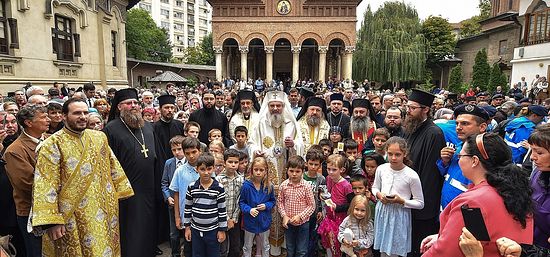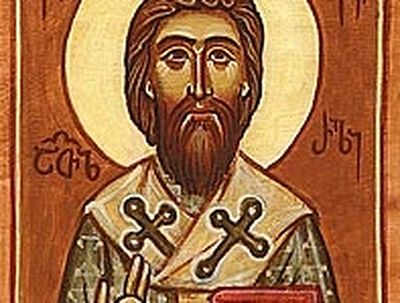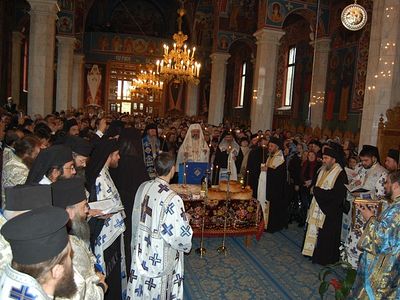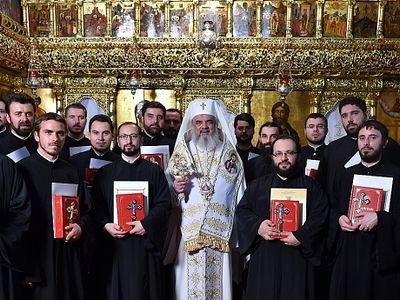Source: Basilica News Agency
Hundreds of faithful participated on Sunday, September 27, 2015, for the celebration of the patronal feast of Antim Monastery in Bucharest, founded by hieromartyr St. Anthimos the Iberian, metropolitan of Wallachia.
The Divine Liturgy was officiated by His Grace Varlaam Ploieşteanul (of Ploiești), assistant bishop to the Patriarch, and His Grace Timotei Prahoveanul (of Prahova), assistant bishop to the Archbishopric of Bucharest. Also serving were His Grace Qais Sadiq, Bishop of Erzurum (Patriarchate of Antioch), the Very Rev. Archimandrite Veniamin Goreanu, Administrative Adviser of the Archdiocese of Bucharest, and the Very Rev. Protosyncelus Vicenţiu Oboroceanu, abbot of Antim Monastery, as well as other hieromonks, priests and deacons.
St Anthimos Developed the Social and Philanthropic Work of the Church
His Beatitude Patriarch Daniel delivered a sermon at the end of the Divine Liturgy in which he praised the activity of St. Anthimos who was characterized as the greatest Metropolitan of Wallachia:
We can observe the hieromartyr St. Anthimos the Iberian in the miraculous catch of fish, bringing crowds of people into the boat of Christ’s salvation, enlightening them through his words and through his printing. He printed books in Romanian, Greek, and Slavic languages in order to help the surrounding peoples—Greeks, Bulgarians, and Serbs—and also in Georgian language, even once sending to Tbilisi a printing press.
We face a holy man of culture, and also a man of practical sense, and a man of Church embellishment, as can be observed in his three-year activity in the Eparchy of Râmnic in which he painted and consecrated many monasteries. He was a merciful man with a practical sense. He developed the social and philanthropic work of the Church and left in his testament that this very monastery would help the poor. St. Anthimos the Ibeiran built this church according to the plans drawn-up by himself. The church was consecrated in 1715, which means that this year we celebrate 300 years from the consecration of the church of Antim Monastery. However, in March 1716 he was arrested, accused of betrayal, defrocked by the Ecumenical Patriarchate of Constantinople and sentenced to life imprisonment, being exiled to St Catherine’s Monastery in Sinai. He never arrived there because, as the story goes, the Turkish soldiers killed him on the way and threw his body into the Tunca River, next to Adrianoupolis (Edirne) of today’s Turkey. St. Anthimos the Iberian died as a martyr because he wanted very much to preserve the Orthodox Faith, and at the same time to protect the Orthodox Church of Wallachia so that she would not be subjected to foreign rulers,” the Patriarch emphasized.
Every Success in the Church Comes By God’s Grace
His Beatitude also underlined the teachings arising from the Gospel passage read on the Eighteenth Sunday after Pentecost (Luke 5:1-11), referring to the miracle wrought by our Saviour Jesus Christ at the Sea of Galilee which refers to the miraculosf work of God's grace which gathers masses of people into His Church:
What is the lesson that our Lord Jesus Christ teaches His disciples from the boat, as from a desk? That every fisherman, representing every servant of Christ’s Church, doesn’t have to put his hope in his personal strengths, competencies, specialization, expertise and, of course, performance, but first he has to acknowledge that every success in the Church comes by God’s grace. We need God’s help even when we are well-prepared. It is a good thing to labor, but at the same time we have to be humble in order for God to grant us His support.
God’s Grace is Offered To Those Who Prepare Themselves To Receive It.
From this Gospel reading we understand that God’s grace is offered to those who humble themselves, as a result of their spiritual labors, His Beatitude added.
Note that this wondrous catch of fish that the fishermen apostles were made worthy of didn’t occur for some lazy fishermen who had slept all night and woke up in the morning with their nets full of fish, but rather the miracle happened for these industrious fishermen who labored and attained humility through fatigue and labor. Their abounding humility made them worthy of this miracle. Therefore, we cannot affirm that God’s grace is given to the lazy, but to those who prepare themselves for receiving it. That is why the prayer read during the ordination of a priest says that sanctification, promotion and commitment to serving the Church come through divine grace which always heals that which is infirm and completes that which is lacking.
His Beatitude also offered to the church several volumes published by the Publishing Houses of the Romanian Patriarchate, and to the faithful small icons of St. Anthimos the Iberian, and His Beatitude received an icon of St. Anthimos as a gift from the community of Antim Monastery.
This place of worship was built between the years 1713 and 1715 at the initiative of St. Anthimos of Wallachia according to his personal plans. An author, typographer, engraver, theologian, bishop and Romanian metropolitan of Georgian origin, St. Anthimos was one of the greatest Wallachian personalities of the eighteenth century. He was canonized by the Holy Synod of the Romanian Orthodox Church in 1992. This year Antim Monastery celebrates 300 years from its consecration.




